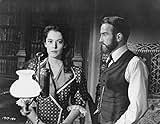An examination of Czech-Austrian psychologist Sigmund Freud's career when he began to treat patients diagnosed with hysteria, using the radical technique of hypnosis.An examination of Czech-Austrian psychologist Sigmund Freud's career when he began to treat patients diagnosed with hysteria, using the radical technique of hypnosis.An examination of Czech-Austrian psychologist Sigmund Freud's career when he began to treat patients diagnosed with hysteria, using the radical technique of hypnosis.
- Nominated for 2 Oscars
- 9 nominations total
- Herr Jacob Koertner
- (as Joseph Furst)
- Student Doctor
- (uncredited)
- Dr. Guber
- (uncredited)
- Wilkie, Student in Paris
- (uncredited)
Storyline
Did you know
- TriviaJean-Paul Sartre wrote the original script at the request of director John Huston, but it was unused as it was too long. It was later published in book form as "The Freud Scenario."
- Quotes
Narrator: Since ancient times there have been three great changes in man's idea of himself. Three major blows dealt us in our vanity. Before Copernicus, we thought we were the centre of the universe, that all the heavenly bodies revolved around our Earth. But the great astronomer shattered that conceit and we were forced to admit our planet is but one of many which swing around the sun, that there are other systems beyond our solar system in myriad worlds. Before Charles Darwin man believed he was a species unto himself separate and apart from the animal kingdom. But the great biologist made us see that our physical organism is the product of a vast evolutionary process whose laws are no different for us than for any other form of animal life. Before Sigmund Freud, man believed that what he said and did were the products of his conscious will alone. But the great psychologist demonstrate the existence of another part of our mind, which functions in darkest secrecy and can even rule our lives. This is the story of Freud's descent into a region almost as black as hell itself: Man's unconscious, and how he let in the light.
- Alternate versionsOriginally prepared at 140 minutes; cut to 120 minutes for theatrical release. Some older TV prints still use the cut version; full-length version is now available on DVD in the UK (as of 2015 there has been no domestic Region 1 DVD release.)
- ConnectionsFeatured in Discovering Huston (2012)
I have seen this film a few times and each time I appreciate it a little more. It concentrates on the years in Sigmund Freud's life around 1890 when he made his groundbreaking studies on the nature of sexuality.
Although I had the impression Freud was more of a solo act, the film shows that after a falling out with the head of the Vienna Hospital, Dr. Theodore Meynert (Eric Portman), friend and mentor Dr. Joseph Breuer (Larry Parks) played a big role in his discoveries.
As Freud deals with one intriguing case after another, he encounters Cecily Koertner, played by a sexy Susannah York, who has a disturbing father hang-up and enough problems for a battalion of pioneering psychiatrists. This was relatively early in Susannah's career and she just about steals the show. Sadly she is gone now, a bit young at 72.
Montgomery Clift's performance has a quality of suffering that he didn't have to fake. Director John Huston pieced together Clift's performance because the actor's life was pretty well out of control by this stage. However, a recent documentary, "Making Montgomery Clift", gives another side to the story with more blame levelled at Huston for the problematic production. That aside, what a presence Monty still had, he was probably the only actor who ever remotely intimidated Brando.
Insights come when Freud deals with the troubled Carl von Schlossen who has savagely attacked his father. Schlossen was played by David McCallum a few years before "Man from Uncle" fame. When Freud deduces the attack was over the younger Schlossen's jealousy of his mother, Freud is shocked into the realisation that his own infantile feelings for his mother may well have gone beyond love of her strudel.
Huston approached all this as a mystery thriller, especially when the treatment of Cecily reveals to Freud that just about all repressed emotional disturbances are based on conflicted feelings toward mum and dad.
Jerry Goldsmith's score helps drive the film; it's as atonal as they come, but it grows on you. Again, like many of the stars, it was early in the career of the great film maestro.
The film mixes in dream sequences with plenty of symbolism reminiscent of the films of Ingmar Bergman. In fact the whole thing has a Bergmanesque quality. And talk about the id and the ego, John Huston delivers God-like narration at key points.
Huston made many great films as well as a couple of duds, however "Freud" was a bold idea; it's challenging, but beautifully made and deserves to be ranked among his best.
- How long is Freud?Powered by Alexa
Details
Box office
- Budget
- $4,000,000 (estimated)
- Gross worldwide
- $6,388
- Runtime2 hours 20 minutes
- Color
- Aspect ratio
- 1.85 : 1
Contribute to this page





































